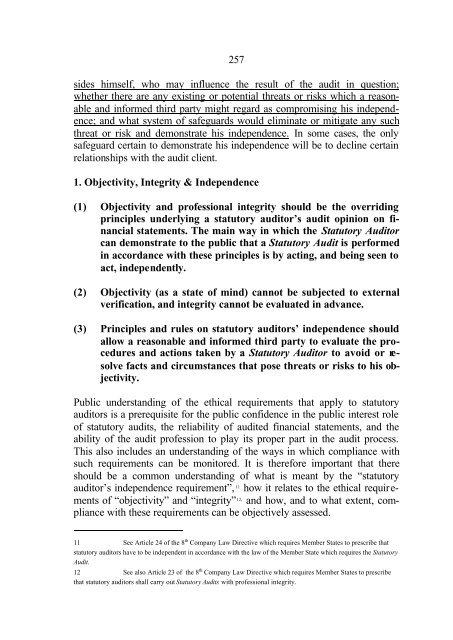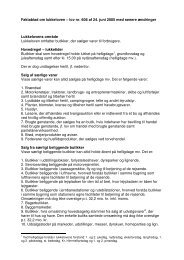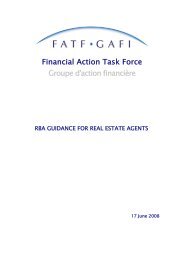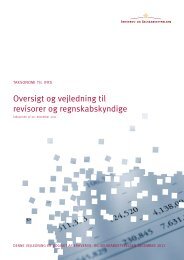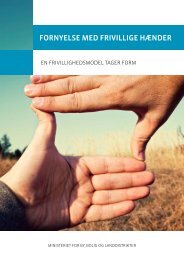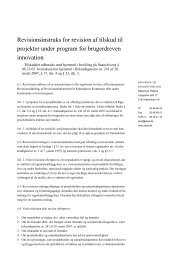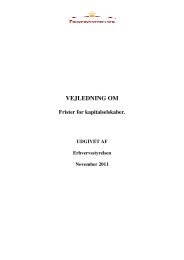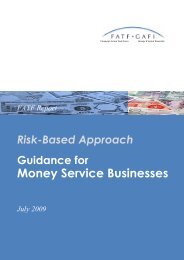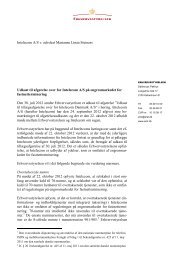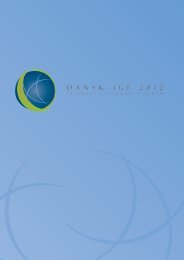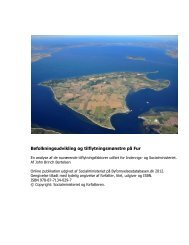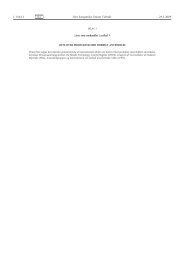- Page 1 and 2:
Betænkning afgivet af Revisorkommi
- Page 3 and 4:
Indholdsfortegnelse 3 Revisorkommis
- Page 5 and 6:
5 2.3.1. Egen interesse............
- Page 7 and 8:
7 6.4.5. Særligt om tavshedspligt
- Page 9 and 10:
9 1. Indledning Revisorkommissionen
- Page 11 and 12:
11 udført arbejde af en art, som f
- Page 13 and 14:
13 2. Oversigt over de væsentligst
- Page 15 and 16:
3. Revisorkommissionens opgaver og
- Page 17 and 18:
17 • revisionsvirksomhedernes eje
- Page 19:
19 eningerne og Revisorkommissionen
- Page 23 and 24:
23 1. Den danske revisorlovgivning
- Page 25 and 26:
25 udvalget betænkning, indeholden
- Page 27 and 28:
27 Med hensyn til spørgsmålet om
- Page 29 and 30:
29 USA udstedte The Securities and
- Page 31 and 32:
31 EU-henstillingen består af to d
- Page 33 and 34:
33 enighed om, hvilke tiltag, der s
- Page 35 and 36:
35 3.3. Gældende dansk regulering
- Page 37 and 38:
37 3.3.2. Gældende ret i hovedtræ
- Page 39 and 40:
39 Samtidig er revisionsvirksomhede
- Page 41 and 42:
41 På den anden side er der en lig
- Page 43 and 44:
43 Hvor den enkelte revisor sålede
- Page 45 and 46:
45 4. Offentlighedens tillidsrepræ
- Page 47 and 48:
47 ningen imidlertid rummer et skri
- Page 49 and 50:
49 forventes at blive påvirket af
- Page 51 and 52:
51 Undlades dette, bærer alene rev
- Page 53 and 54:
53 Uanset hvilken model, der måtte
- Page 55 and 56:
55 det, der fremgår af henstilling
- Page 57:
57 Tilsvarende har man senere opere
- Page 61 and 62:
1. Lovens område 61 1.1. Gældende
- Page 63 and 64:
63 hvervgivers egen brug, vil den s
- Page 65 and 66:
65 Revisors kerneområde dækker s
- Page 67 and 68:
67 som anført i del 1, med til at
- Page 69 and 70:
69 ning. Konsekvenserne for discipl
- Page 71 and 72:
71 1.4.1.2. Revisorkommissionens ov
- Page 73 and 74:
73 910 af 1. december 1995 om stats
- Page 75 and 76:
75 ringer. Det er dog kommissionens
- Page 77 and 78:
77 Reglerne om henholdsvis generel
- Page 79 and 80:
79 • anvendelse af andre procedur
- Page 81 and 82:
81 Indtil dette sker, er det nødve
- Page 83 and 84:
83 I forhold til den eksisterende r
- Page 85 and 86:
85 Tilsvarende er der i selskabslov
- Page 87 and 88:
87 2.4. Den omfattede personkreds I
- Page 89 and 90:
89 3. Revisionsvirksomhedens rolle
- Page 91 and 92:
91 aktierne eller anparterne i sels
- Page 93 and 94:
93 desuden mulighed for, at et revi
- Page 95 and 96:
95 I revisionsselskaber skal bestyr
- Page 97 and 98:
97 I et revisionsaktieselskab skal
- Page 99 and 100:
99 målet, og Revisorkommissionen f
- Page 101 and 102:
101 rallellitet til forslaget om, a
- Page 103 and 104:
103 Ifølge 8. direktiv er det for
- Page 105 and 106:
105 Da Revisorkommissionen imidlert
- Page 107 and 108:
107 ger kommissionen det også stor
- Page 109 and 110:
109 efter lovforslaget får mulighe
- Page 111 and 112:
111 sors titel, således at såvel
- Page 113 and 114:
113 IFAC’s regler gennemgås nær
- Page 115 and 116:
115 Bestemmelsen kom ind i revisorl
- Page 117 and 118:
117 vendelse af almindelige kalkula
- Page 119 and 120:
119 Hvor forbudsreglen i LSR § 14,
- Page 121 and 122:
121 også afhængigt af f.eks. fors
- Page 123 and 124:
123 - no pay” og ”good cure - g
- Page 125 and 126:
125 revisionen, har været revisor
- Page 127 and 128:
127 har diskuteret periodens længd
- Page 129 and 130:
129 Ved udformningen af eventuelle
- Page 131 and 132:
131 endelige henstilling samt drøf
- Page 133 and 134:
133 6.2.2. Metoder til kvalitetssik
- Page 135 and 136:
135 yderligere 11 firmaer forventes
- Page 137 and 138:
137 6.4.2. Overordnet ansvar for ko
- Page 139 and 140:
139 6.4.4. Gennemførelsen af kontr
- Page 141 and 142:
141 vurdering af de enkelte afdelin
- Page 143 and 144:
143 en kunde, kreditorer i en kunde
- Page 145 and 146:
145 Revisorkommissionen har drøfte
- Page 147 and 148:
147 aktive i. Således skal det sik
- Page 149 and 150:
149 nernes sammenhæng til indholde
- Page 151 and 152:
151 Det betyder imidlertid ikke, at
- Page 153 and 154:
153 7. Overvejelser om opretholdels
- Page 155 and 156:
155 eller Dansk Erhvervsgartnerfore
- Page 157 and 158:
157 Revisorkommissionens lovforslag
- Page 159 and 160:
159 Del 3 Forslag til lov om statsa
- Page 161 and 162:
161 3.1.Forslag til lov om statsaut
- Page 163 and 164:
163 § 6 . Beskikkelse som statsaut
- Page 165 and 166:
165 hvortil der i lovgivningen kræ
- Page 167 and 168:
167 Stk. 5 . Erhvervs- og Selskabss
- Page 169 and 170:
169 neste to år har udført andre
- Page 171 and 172:
171 8 uger efter, at ejerforholdet
- Page 173 and 174:
173 nævnes kvalitetskontrollanter.
- Page 175 and 176:
175 Stk. 6 . Erhvervs- og Selskabss
- Page 177 and 178:
177 § 32 . Revisornævnets afgøre
- Page 179 and 180:
179 dag i en måned, eller hvis fri
- Page 181 and 182:
181 inden for en nærmere fastsat p
- Page 183 and 184:
183 Stk. 3, 1. pkt. fastslår, at r
- Page 185 and 186:
185 opnår revisorer ikke en konkur
- Page 187 and 188:
187 Bestemmelsen om fratagelse på
- Page 189 and 190:
189 Stk. 1 indeholder reglerne om r
- Page 191 and 192:
191 resser. Der er derfor intet til
- Page 193 and 194:
193 givne situationer, bør være u
- Page 195 and 196:
195 ning, således at den omfatter
- Page 197 and 198:
197 dens vegne og samtidig skal erk
- Page 199 and 200:
199 af stk. 3. Ved vurderingen af,
- Page 201 and 202:
201 tænkes også på bistand ved s
- Page 203 and 204:
203 Foreligger der således rent fa
- Page 205 and 206: 205 mere i både et statsautorisere
- Page 207 and 208: 207 Bestemmelserne i nr. 1-4 svarer
- Page 209 and 210: 209 Stk. 9 og 10 svarer med de kons
- Page 211 and 212: 211 muleringen ”gøres afhængigt
- Page 213 and 214: 213 Stk. 3 fastlægger kontrolfrekv
- Page 215 and 216: 215 deringen af kvalitetsstyringen
- Page 217 and 218: 217 Endelig er det en forudsætning
- Page 219 and 220: 219 Dog må det forventes, at råde
- Page 221 and 222: 221 Hjemlen er i den gældende lovg
- Page 223 and 224: 223 Da sammensætningen af Kvalitet
- Page 225 and 226: Del 4 Bilag 225
- Page 227 and 228: 227 1. Kommissorium for Revisorkomm
- Page 229 and 230: 229 sorlovgivningens uafhængigheds
- Page 231 and 232: 231 Forudsætningen for en sådan s
- Page 233 and 234: 233 omfang afskåret fra at anvende
- Page 235 and 236: 235 områder, som i dag i betydelig
- Page 237 and 238: 237 og Selskabsstyrelsen. Generelt
- Page 239 and 240: 239 forretningspapirer skal fremgå
- Page 241 and 242: 241 et hotel ejet i interessentskab
- Page 243 and 244: 243 Krydsrevision Man har inden for
- Page 245 and 246: 245 Drøftelserne bedes påbegyndt
- Page 247 and 248: 247 Kommissionens forslag synes meg
- Page 249 and 250: 249 og på den måde sikre, at alle
- Page 251 and 252: 251 2. EU-Kommissionens henstilling
- Page 253 and 254: 253 the support of the Council, the
- Page 255: 255 proper standards of integrity a
- Page 259 and 260: 259 on all issues encompassed withi
- Page 261 and 262: 261 ∗ providing his Network membe
- Page 263 and 264: 263 ∗ any other person within the
- Page 265 and 266: 265 The more clearly a Statutory Au
- Page 267 and 268: 267 whether existing safeguards eli
- Page 269 and 270: 269 ∗ the involvement of a Govern
- Page 271 and 272: 271 The disclosure to the Governanc
- Page 273 and 274: 273 gle non-auditor owner to 5% or
- Page 275 and 276: 275 The design and documentation of
- Page 277 and 278: 277 partnerships where either all P
- Page 279 and 280: 279 (ii) any indirect financial int
- Page 281 and 282: 281 dition, an unacceptable level o
- Page 283 and 284: 283 on the one hand, and the Audit
- Page 285 and 286: 285 chase of office equipment, EDP
- Page 287 and 288: 287 (b) the immediate removal of an
- Page 289 and 290: 289 In cases, where the individual
- Page 291 and 292: 291 (a) holds a senior management p
- Page 293 and 294: 293 There will be occasions where t
- Page 295 and 296: 295 making on behalf of, the Audit
- Page 297 and 298: 297 assistance, the accounting entr
- Page 299 and 300: 299 will have to participate in the
- Page 301 and 302: Spectrum of Involvement 301 There i
- Page 303 and 304: 303 Valuation services leading to t
- Page 305 and 306: 305 management), participation by t
- Page 307 and 308:
307 sentation of an Audit Client be
- Page 309 and 310:
309 A Statutory Auditor who is aske
- Page 311 and 312:
311 and the conduct of any current
- Page 313 and 314:
313 ceived to be dependent on fees
- Page 315 and 316:
315 tory body. The threats to the S
- Page 317 and 318:
317 as rotation and measures under
- Page 319 and 320:
319 of the Audit Firm which is the
- Page 321 and 322:
321 the relevant requirements. Part
- Page 323 and 324:
323 3. EU-Kommissionens henstilling
- Page 325 and 326:
325 streges, hvor vigtigt det er, a
- Page 327 and 328:
327 Alle medlemsstater har allerede
- Page 329 and 330:
329 også offentliggøres oplysning
- Page 331 and 332:
Bilag 4 Gældende lovgivning 331 4.
- Page 333 and 334:
333 § 5 . Beskikkelse som statsaut
- Page 335 and 336:
335 bestyrelsesmedlem, direktør, a
- Page 337 and 338:
337 nogen af de under 1) angivne m
- Page 339 and 340:
339 Kapitel 3 Disciplinærnævn og
- Page 341 and 342:
341 Stk. 2 . Revisornævnet behandl
- Page 343 and 344:
343 Stk. 2 . Er fristen angivet i u
- Page 345 and 346:
345 den i § 1, stk. 2, nr. 4 og 5,
- Page 347 and 348:
347 rapporter, der kræves i henhol
- Page 349 and 350:
349 aktierne eller anparterne. Ved
- Page 351 and 352:
351 Stk. 3. Der kan pålægges sels
- Page 353 and 354:
353 Stk. 2 . Forældelsesfristen af
- Page 355 and 356:
355 4.3. Uddrag af lov nr. 227 af 2
- Page 357 and 358:
357 ”3) hvis retten til at være
- Page 359 and 360:
359 Ȥ 4 b. Har en virksomhed pli
- Page 361 and 362:
361 Aktier § 5. Aktier i et revisi
- Page 363 and 364:
363 omfattet af stk. 1 til indfriel
- Page 365 and 366:
365 Stk. 2. I modervirksomheder, de
- Page 367 and 368:
367 Stk. 3. Supplerende oplysninger
- Page 369 and 370:
369 opmærksom på forhold, der kan
- Page 371:
371 Bilag 6 Oversigt over benyttede


